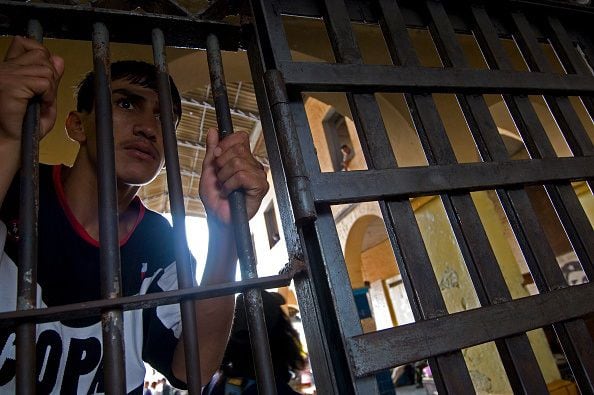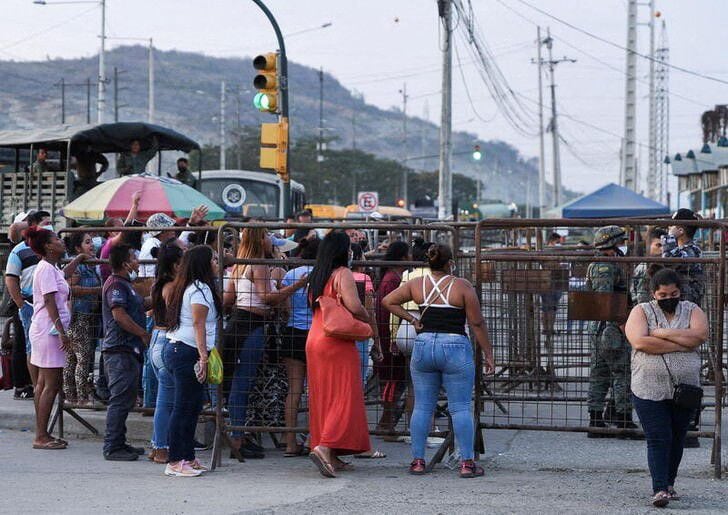
In its most recent report, the Inter-American Commission on Human Rights (IACHR) gave Ecuador guidelines to overcome the crisis in the prison system that has left at least 316 people dead due to violence in prisons. According to the IACHR, the State must regain control of prisons and develop a policy focused on crime prevention and not on tightening the penalties for which prison is punishable.
The Commission acknowledges that Ecuadorian prisons are in the hands of criminal gangs. In addition, the Ecuadorian State acknowledged that it has no control over what happens inside the rehabilitation centers, which have become the headquarters of the prison gangs. In Ecuador's prisons, “the leaders of these groups (criminal gangs) charge illegitimate and abusive prices to other inmates for their cells and beds, as well as for access to services.”
The IACHR prepared its report based on its visit to Ecuador between December 1 and 3, 2021. The visit was led by the Rapporteur on the rights of persons deprived of liberty, Commissioner Stuardo Ralon, together with Tania Reneaum Panszi, Executive Secretary, Maria Claudia Pulido, Deputy Secretary for Monitoring and Technical Cooperation, and technical team. The document addresses concerns about the lack of controls and corruption within prisons: “the absence of effective control by the State in the centres where the most serious acts of violence occurred, which would have resulted in intra-prison control being carried out by the persons themselves detainees”, a statement was read.

During 2021, bloodbaths in prisons left hundreds dead. The majority of those killed were young people in pre-trial detention charged with minor offences, and some even had the release ballot, as published by the Commission.
According to the IACHR, the problems of the Ecuadorian prison system are “a structural nature that has been taking place for at least two decades”. The main reasons for the crisis, according to the report, are the weakening of institutions, the elimination of the Ministry of Justice and Human Rights and its impact on the prison environment, which took place in 2018, during the administration of Lenín Moreno. Also among the causes are corruption, lack of proper registration of persons deprived of liberty, budget reduction, lack of custodial personnel, lack of prison policy, policy of imprisonment rather than crime prevention, overcrowding, the creation of mega prisons, the indiscriminate use of pre-trial detention, among others.
Changes in public policy, dignity for prisoners and less overcrowding
In its report, the Commission notes that States must establish strategies to dismantle the criminal structures rooted in prisons that control various criminal activities, such as trafficking in drugs, alcohol and the collection of extortion fees from other detainees and indicates that it “has identified that, by in general, these structures operate in complicity with prison authorities and other security forces”.
The IACHR is emphatic in pointing out that there must be comprehensive policies that focus on crime prevention and social reintegration. Ecuador, as explained in the document, has a punitivist and securist policy focused “on high levels of imprisonment and the construction of mega-prisons, the application of pretrial detention contrary to international standards in this field; extension of criminal offences with deprivation of liberty; hardening of sentences; and challenges to the application of alternative measures to pre - trial detention and other benefits of release”.
In addition, the Commission notes that the institutionality of the prison system is weakened by "lack of clear, consolidated, systematized and automated information on the prison population; insufficient budget for the prison system, together with a lack of focus on rehabilitation; and inadequate prison staff ”.

Among the recommendations made by the Commission in the report is to increase the number of prison personnel who should be responsible for prison security. In addition, it urges that the government act to reduce the prison population in order to “immediately remedy any housing situation above the established number of places”.
One of the concrete actions established by the Commission is that “as a matter of priority, no detainee should be admitted to the Guayas No. 1 detention center. This, in view of overpopulation, high levels of violence and the lack of effective control by the authorities”. The IACHR refers to the Litoral Penitentiary, where the massacres took place the previous year.
Another recommendation that the IACHR emphasizes is the proper use of pretrial detention, a precautionary measure that should be used exceptionally, but which in Ecuador is used almost as a rule. The Commission indicates that the misuse of this remedy has resulted in 14,274 (39%) of 36,599 prisoners in Ecuador, as of November 2021, being held without conviction.
During its visit, which served to prepare the report, the delegation of the IACHR found that Ecuadorian prisons maintain unworthy conditions for prisoners and concluded that these centers “deviate from inter-American standards regarding deprivation of liberty.” Among the recommendations, the Commission called for guarantees for prisoners and called for the State to implement “conditions of detention compatible with human dignity and respect for human rights” and that prisoners be cared for by health personnel and with “sufficient, safe and acceptable water”.
KEEP READING:
Últimas Noticias
Debanhi Escobar: they secured the motel where she was found lifeless in a cistern
Members of the Specialized Prosecutor's Office in Nuevo León secured the Nueva Castilla Motel as part of the investigations into the case

The oldest person in the world died at the age of 119
Kane Tanaka lived in Japan. She was born six months earlier than George Orwell, the same year that the Wright brothers first flew, and Marie Curie became the first woman to win a Nobel Prize

Macabre find in CDMX: they left a body bagged and tied in a taxi
The body was left in the back seats of the car. It was covered with black bags and tied with industrial tape
The eagles of America will face Manchester City in a duel of legends. Here are the details
The top Mexican football champion will play a match with Pep Guardiola's squad in the Lone Star Cup

Why is it good to bring dogs out to know the world when they are puppies
A so-called protection against the spread of diseases threatens the integral development of dogs




